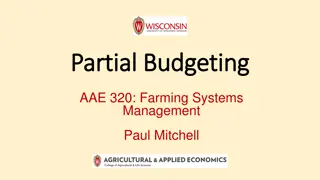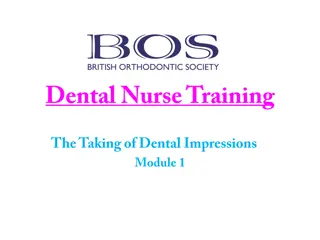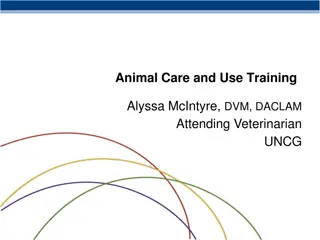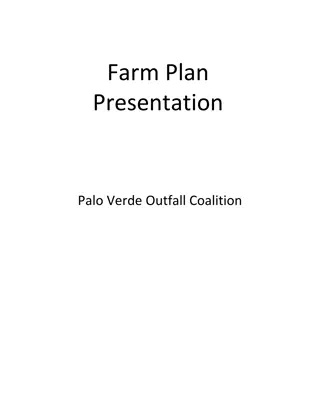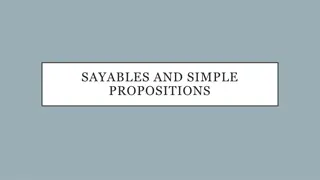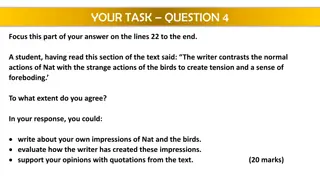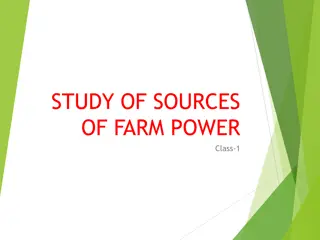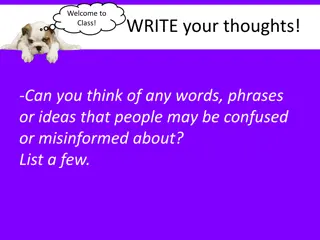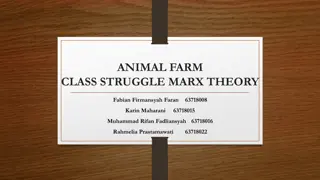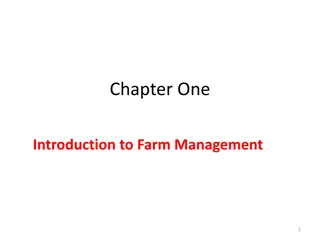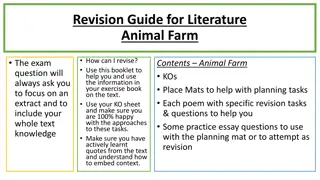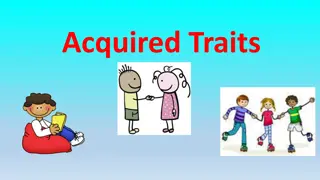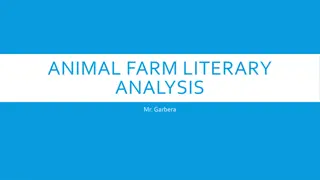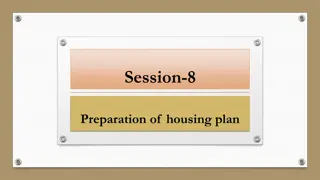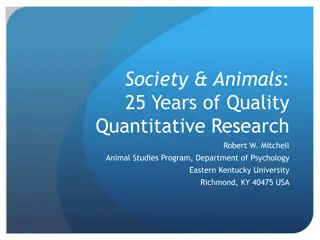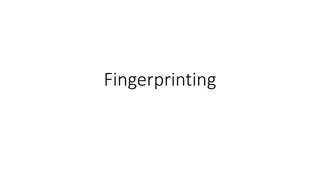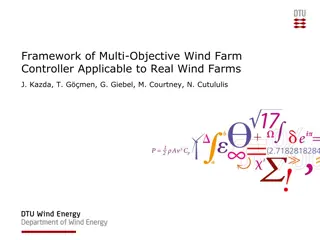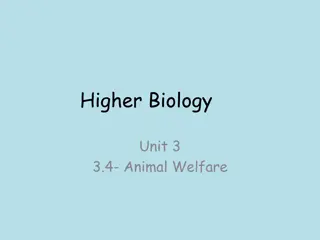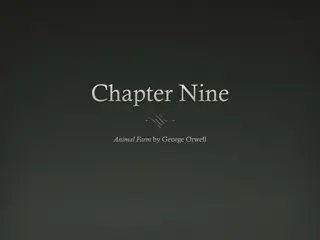Analyzing Chapter 1 of Animal Farm: Characters, Impressions, and Banned Behaviors
In Chapter 1 of Animal Farm, we are introduced to various characters such as Old Major, Mr. Jones, and different animals on the farm. Orwell uses language to portray each character's qualities and roles. The chapter focuses on Old Major's speech about revolution and equality, leading to the animals forming a dream of a better future. The chapter ends with a list of banned human behaviors that all animals must adhere to. Themes of power, hierarchy, and revolution are evident, setting the stage for the events to follow.
Download Presentation

Please find below an Image/Link to download the presentation.
The content on the website is provided AS IS for your information and personal use only. It may not be sold, licensed, or shared on other websites without obtaining consent from the author. Download presentation by click this link. If you encounter any issues during the download, it is possible that the publisher has removed the file from their server.
E N D
Presentation Transcript
Making Notes on each Chapter KeyNotes Reminders Questions Main Lesson Notes Summary of learning
Key Terminology: Persuasion the act of deliberately making people think in a certain way Irony deliberate contradictions to make a humorous point or to deliberately contrast the literal meaning Repetition repeating key ideas Pronouns using he/she etc. instead of names Manor/Animal Farm Chapter 1 As we read think carefully about: Staging of the characters Who we meet? What impressions we have of these characters? Why we have these impressions? What language is used by Orwell? Vocabulary to embed in your notes: Hierarchy Marxist Exploitation Proletariat Equality/Inequality Revolution Marxist school of thought exploitation of proletariat (workers) by Capitalists You will be making chapter notes in your books before working closely on Old Major s speech
Who we meet? Impressions? Why? Who we meet? Impressions? Why? Old Major Boar male pig - old powerful confident wise Marxist on stage gives speak Mr Jones drinks too much only cares about money exploiting the animals forgetful Mrs Jones asleep Jessie, Pincher and Bluebell learn the song intelligent don t like the rats important (at the front) The Pigs intelligent important (at the front) Boxer well-respected dumb or unintelligent strong (as two horses) best friend the donkey kind/respectful Clover motherly (maternal) caring kind to the other animals keeps the ducklings safe Mollie vain eats sugar (likes treats) wears red ribbons late likes to be the centre of attention stubborn - selfish The Hens working class exploited for their eggs many of them Pigeons observe what is happening not involved yet Moses Old Raven missing from the meeting Benjamin The Donkey oldest animal moody/bad-tempered/cantankerous loyal to Boxer Ducklings innocent The cat dislikes the rats predator duplicitous (lies/cheats when possible) Three Rats stand upright like people listen and learn (vermin by others) Muriel the goat she is enigmatic (we don t know anything about her)
Banned human behaviour Banned human behaviour No animal should: sleep in a bed touch alcohol or money wear clothes smoke tobacco engage in trade live in a house kill any other animal Old Major s dream was a song: Beasts of England Animals of England unite against Man Song is a symbol of revolution A call to overthrow man All animals are equal
Key Terminology: Biblical Connotations/references references that have been made from the bible foreshadowing hinting at something that happens later in the novel Omniscient Narrator all-knowing narrator Commanding tone a tone that shows the character can take charge and give orders Manor/Animal Farm Chapter 2 As we read think carefully about: What happens? Who is in charge? What impressions do we have of different characters at this point in the novel? Why do we have these impressions? What language is used by Orwell to create these impressions? What have they achieved now? Vocabulary to embed in your notes today: Utopia Revolution/Rebellion Usurp Commandments Animalism Deception You will be making chapter notes in your books again before working closely on the seven commandments
Chapter 2 Snowball described as vivacious and a good speaker he is lively & engaging cleverer & more inventive Napoleon prize boars being bred for sale large and fierce looking animal not as good a character as Snowball offers the animals double rations Squealer very persuasive Mr Jones got drunk and didn t feed them, so they got hungry and angry. This led to the animals revolting by accident. They chased the humans Mr Jones and the farmhands Napoleon and Snowball establish themselves as leaders Mollie preens (shows off) herself in front of the mirror with ribbons
The Seven Commandments 1. Whatever goes upon two legs is an enemy. (HUMANS MAN Links to Old Major s distrust and rebel rousing speech) 2. Whatever goes upon four legs, or has wings, is a friend. (ANY ANIMAL SHOULD BE EQUAL) 3. No animals shall wear clothes. (TOO HUMAN) 4. No animal shall sleep in a bed. (TOO HUMAN) 5. No animal shall drink alcohol. (REMINDER OF MR JONES) 6. No animal shall kill any other animal. (SLAUGHTER LIKE JONES) 7. All animals are equal. (DREAM/UTOPIA FOR THEM RUNNING THE FARM THEMSELVES)
Key Terminology: Repetitive motif a symbol or idea that comes up again and again in the novel Noun phrases adjectives used to describe the nouns Contrasting characters characters that seem to be deliberately oppositional Juxtaposition placing opposing ideas next to each or in close proximity Manor/Animal Farm Chapter 3 As we read think carefully about: What happens? How are the characters developing at this point in the novel? What language is used by Orwell to create these impressions? What is the significance of Education in this chapter? What have they achieved at this point? Are the animals happy? Are the animals equal? Vocabulary to embed in your notes today: Toiled Committees Justice Equity Progress Manipulation/Manipulating You will be making chapter notes in your books again before working closely on the way Education is presented in this chapter.
Pigs Napoleon and Snowball are at loggerheads (they disagree on everything) they put forward all the resolutions on a Sunday meeting. The pigs don t work they are brain workers Boxer gets up early all animals in awe of his strength he works like three horses and has tremendous muscles . Personal motto I will work harder although he can only learn A B C D Committees Snowball wants progress and thinks workers having committees will provide this. He sets them up but they fail (as most of the animals don t really care) Education -
Education Quotes to Explode Education Quotes to Explode Snowball also busied himself into organising what he called Animal Committees Boxer could not get beyond the letter D Mollie refused to learn any but her own name. As for the pigs they could read and write almost perfectly Benjamin could read as well as any pig, but never exercised his facility all the humbler animals set to work to learn the new maxim by heart nine sturdy puppies weaned Napoleon took them from their mothers make himself responsible for their education kept them in seclusion (think foreshadowing here)
What is an exploded quote? What is an exploded quote? Who is this relevant to in the novel? Connotations of one word Theme link Snowball also busied himself into organising what he called Animal Committees How does it link to other examples in the text? What context can you link to this? What does it mean? Literal and inference Terminology/Technique
Boxer vs Mollie Boxer vs Mollie Write an extended paragraph using the examples below (or your own too) How the two horses are presented: Boxer Mollie Personal Motto I will workharder has integrity, strong work ethic. Personal Pronoun used to show his selflessness. No work ethic Mollie, it was true, was not good at getting up in the mornings, and had a way of leaving work early stone in her hoof lacks integrity shirks responsibility lazy complex sentence via the omniscient narrator tremendousmuscles more like three horses than one symbolic of hard workers Mollie refused to learn any but the five letters in her name self interested obstinate selfish - verb Boxer could not get beyond the letter D. would stand staring at them tries hard short sentence decorate them with a flower or two and walk around admiring them vacuous likes pretty things no substance description How does Orwell juxtapose the two horses and what is this showing about society? Orwell in Animal Farm shows the juxtaposing characters of Boxer and Mollie through This is shown by (terminology) in quotation to suggest/imply/demonstrate Boxer seems , while Mollie is Perhaps, Orwell is suggesting
Key Terminology: Semantic field a set of words related in meaning Symbolism the use of symbols in the literature to present meaning Characterisation the art (of the writer) of deliberately crafting characters Allegorical using the text to make a political point Manor/Animal Farm Chapter 4 As we read think carefully about: How does the message of animal farm spread? What does this result in? Think about the challenge to power from the humans. How do the different characters react when the humans attempt a revolt? At what price is victory? Do you think all animals feel it is worth it? Vocabulary to embed in your notes today: Envoys messengers Enemies someone working against you (opposed to you) Collaboration working together Battle - fight Victorious successful - winner Cowardice deliberately avoiding confrontation Bittersweet good and bad feeling You will be making chapter notes in your books again before working closely on the way characters react to The Battle of the Cowshed.
The Battle of the Cowshed Snowball led the charge Julius Caesar Mollie is hiding cowardly in the hay barn One sheep dies Boxer is distraught because he thought he killed a boy he was just stunned but Boxer showed compassion The pretended to retreat and then ambushed the men Snowball was injured as he led the charge Boxer was the hero as the men ran after they thought he had killed one of them Animals were victorious and the men were defeated
The Battle of the Cowshed: Applying your knowledge You will be bringing together your understanding of Orwell s presentation of character, use of language and the structure of the text from Chapter 1 to Chapter 4. Essay Question: How does Orwell use imagery relating to war, revolution and conflict in his allegorical novel Animal Farm? You need to create an introduction that has: 1 User the author s surname only; 2 Use adverbs to say how the author has presented a theme/character or idea; 3 Linked to the question; 4 Can use terminology; 5 Say where in the play the extract is from; 6 Use triplets to say what you think about the presentation of character/theme in the extract and do this again for elsewhere in the play; 7 Use connectives to link to earlier in the play; 8 In the final sentence link to the theme (for a character question) or characters (for a theme question) Your main focus in the essay will need: Your opinion on the question with the context that drives Orwell s choices terminology used by Orwell a range of quotes that you have selected meaning inference connotations effect writers intentions. Cover 3 main events that links to the question. Your conclusion will have: 1 - Use a conclusive phrase to show you are summarising now; 2 Use Orwell s surname; 3 Reference context; 4 Link back to the introduction; 5 Writer s intentions; 6 Triplets to reinforce the writer s intentions; 7 Final line of text or important line that you quote if it is particularly relevant
Key Terminology: Semantic field a set of words related in meaning Symbolism the use of symbols in the literature to present meaning Juxtaposing placing opposing ideas next to each or in close proximity Foreshadowing hinting at something that happens later in the novel Manor/Animal Farm Chapter 5 As we read think carefully about: Mollie s behaviour and what this could foreshadow The Sheep and what this symbolises Napoleon and Snowball s leadership characteristics The dogs Semantic Field relating to combat/war The staging of the animals at the end Vocabulary to embed in your notes today: Disgruntled Unsettled Myopic lack of foresight Paradise Troublesome Insurrection You will be making chapter notes in your books again before working closely on the way context has been employed in CH1 to Ch5
Context Context Who do different characters represent? What political regimes are being critiqued by Orwell? How does he critique theses regimes in the book? Orwell fought in the Spanish civil war: In conversation with Philip Mairet, editor of New English Weekly, Orwell said: 'This fascism ... somebody's got to stop it'.To Orwell, liberty and democracy went together, guaranteeing, among other things, the freedom of the artist; the present capitalist civilization was corrupt, but fascism would be morally calamitous. However, the fighting disillusioned him. How can this be seen in Animal Farm so far?
Key Terminology: Connotations inferences made about words or phrases used Symbolism the use of symbols in the literature to present meaning Juxtaposing placing opposing ideas next to each or in close proximity Foreshadowing hinting at something that happens later in the novel Allegory wider political message in the story Manor/Animal Farm Chapter 6 As we read think carefully about: Slavery connotations of the use of this simile What is the building of the windmill symbolic of? Slogans Why do the animals need these? What are the various slogans used? How do these juxtapose each other? What do they show about the solidarity in the farm? Deception the changing of the rules Business agreements Vocabulary to embed in your notes today: Dogmatic Deception Corruption Insincerity Perception You will be making chapter notes in your books again before working closely on the way Napoleon is rewriting history.
Re Re- -writing History writing History Complete the table with examples where Napoleon re-writes history: take a whole page as we will add to this as we go through the text Ways Napoleon changes what has happened Effect of this How you feel? What you think about this? What impact this has on the other animals? Whether this is justifiable? How this links to the context of the novel? Snowball has been relegated to Animal Hero. Second Class and he should be captured alive! This seems terribly unfair, Snowball was evicted because he was a threat to Napoleon s domination, suggesting Napoleon is becoming more and more dictatorial in his leadership style. The other animals seem to have unquestioningly accepted the changes and gradual deceptions. It is unjust, but as no- one is standing up to Napoleon, there is little that will be done. Links to the death of Trotsky as No animal shall sleep in a bed with sheets shows that the commandment on the wall has been changed. Clearly, Orwell is showing the hypocrisy of the pigs as they made the rules and painted them up in the first place, but now that it suits them, they no longer treat the farmhouse as a museum instead taking advantage of the comforts, the same as men. It suggests Napoleon wants to be more human and show that he is superior to the other animals as he feels he deserves different treatment to them. Peasants had no comfort in Russia, whereas the aristocracy would have riches and comfort so Orwell highlights this unfairness.
Re Re- -writing History writing History Complete the table with examples where Napoleon re-writes history: take a whole page as we will add to this as we go through the text Ways Napoleon changes what has happened Effect of this How you feel? What you think about this? What impact this has on the other animals? Whether this is justifiable? How this links to the context of the novel? Snowball has been relegated to Animal Hero. Second Class and he should be captured alive! No animal shall sleep in a bed with sheets shows that the commandment on the wall has been changed.
Key Terminology: Pathetic Fallacy simplistically; using the weather to make a point about the thoughts, feelings and experiences of the characters Symbolism the use of symbols in the literature to present meaning Allegory wider political message in the story Manor/Animal Farm Chapter 7 As we read think carefully about: How the weather creates a miserable atmosphere for the animals Rebellion and insurrection from the ranks and the effect of this The use of Snowball as a form of propaganda to keep the animals in line Explore the murders/executions of the animals Vocabulary to embed in your notes today: Propaganda Insurrection Dictatorship Starvation Hunger-strike Fear terror mind-games manipulation Violence murder executions assassinations - purged You will be making chapter notes in your books again before analysing the violence and horror evident in the murders of the animals by annotating for meaning.
Murder most foul Murder most foul Context: A series of animals confess: all are killed. Stalin "purged" the Soviet government by torturing those he considered enemies until they admitted to crimes they hadn't committed. How does this contextual fact link to the extract you have been given? Annotate the extract to show how the behaviour of Napoleon and the dogs closely matches Stalin s behaviour. Reference the terminology used The meaning and effect of the quotes that you select
Key Terminology: Pathetic Fallacy simplistically; using the weather to make a point about the thoughts, feelings and experiences of the characters Symbolism the use of symbols in the literature to present meaning Allegory wider political message in the story Manor/Animal Farm Chapter 8 As we read think carefully about: Memory the animals appear to be brainwashed how can this be evidenced and supported? The dogs & Napoleon what does the guarding of him show? The portrait and poem suggest Explore how Frederick is presented. What does it show or suggest? Double dealing and trickery is evident in this chapter. What does this infer about the humans and Napoleon? Drunken behaviour. What does this indicate? Describe what happens in the Battle of the Windmill. How does the victory seem poignant? Vocabulary to embed in your notes today: Brainwashed Separation Paranoia Capitalism Greed Treachery Victory Bittersweet Poignant You will be making chapter notes in your books again, next we ll look at how the different Battles are presented in an essay.
Characterisation: Applying your knowledge You will be bringing together your understanding of Orwell s presentation of character, use of language and the structure of the text from Chapter 1 to Chapter 8. Essay Question: How does Orwell s characterisation show the complex emotions felt by different animals across the allegorical novel Animal Farm? You need to create an introduction that has: 1 User the author s surname only; 2 Use adverbs to say how the author has presented a theme/character or idea; 3 Linked to the question; 4 Can use terminology; 5 Say where in the play the extract is from; 6 Use triplets to say what you think about the presentation of character/theme in the extract and do this again for elsewhere in the play; 7 Use connectives to link to earlier in the play; 8 In the final sentence link to the theme (for a character question) or characters (for a theme question) Your main focus in the essay will need: Your opinion on the question with the context that drives Orwell s choices terminology used by Orwell a range of quotes that you have selected meaning inference connotations effect writers intentions. Cover 3 main events that links to the question. Your conclusion will have: 1 - Use a conclusive phrase to show you are summarising now; 2 Use Orwell s surname; 3 Reference context; 4 Link back to the introduction; 5 Writer s intentions; 6 Triplets to reinforce the writer s intentions; 7 Final line of text or important line that you quote if it is particularly relevant
Characterisation: Applying your knowledge You will be bringing together your understanding of Orwell s presentation of character, use of language and the structure of the text from Chapter 1 to Chapter 8. Essay Question: How does Orwell s characterisation show the complex emotions felt by different animals across the allegorical novel Animal Farm? Planning: Either create a detailed mind map or a bullet point list of information to include in your essay. Choose 3 4 moments/events across the novel that shows how the animals feel at different points in the novel. Select quotes from these moments that will show how the animal feels. Show progression/changes in the way the characters are presented. Remember you can t cover everything, so you need to select examples/moments carefully.
Key Terminology: Irony conveying an opposite meaning to the literal meaning Manor/Animal Farm Chapter 9 As we read think carefully about: Health Old Age Deception of Boxer and the implication of living in a society that will take everything from you but not look after you in old age The ultimate betrayal by the pigs with the whisky why is this a real true betrayal of Boxer and all he symbolised? Vocabulary to embed in your notes today: Futility False representation Retirement Utopia Betrayal You will be making chapter notes in your books again, next we ll explore the symbolic representation of the different characters.
Characters and how they are symbolic Characters and how they are symbolic representations representations Explore the following characters and create mind maps to show how they are presented across the text and what they may symbolically represent: Napoleon Boxer Clover Squealer The Dogs Old Benjamin Moses The Sheep
Manor/Animal Farm Chapter 10. Full Circle What is wrong with this phrase? MORE EQUAL
Key Terminology: Manor/Animal Farm Chapter 10 As we read think carefully about: How the pigs and the humans morph How the start of the novel and the end share similarities. The changing of the seven commandments How Napoleon achieved a dictatorship The fact that Napoleon carries a whip- seen at the opening of the book as a symbol of man s vicious oppression- suggests a violent future lies ahead. Circular structure = a plot device where characters end up in the same position that they were in the first place. Vocabulary to embed in your notes today: Morphing Abolished Oxymoronic Key Theme: Inhuman leaders Far from having nothing to do with man, as Major ordered, the pigs have actually surpassed man, as is clear when Mr Pilkington congratulates Napoleon on managing to run a farm in a crueller way than he does- and Napoleon says further restrictions are planned. The pigs have systematically violated the commandments while claiming to support the revolution and have abused the animals trust, leaving the animals in a worse position than at the start of the book.
Key Terminology: Manor/Animal Farm Chapter 10 Key Quotations: Simplifying Language Circular structure = a plot device where characters end up in the same position that they were in the first place. The Seven Commandments are reduced at the end of the story to one single maxim: ALL ANIMALS ARE EQUAL BUT SOME ANIMALS ARE MORE EQUAL THAN OTHERS This slogan is oxymoronic (it is impossible to be more equal. It shows us how the pigs manipulate language to distort the reality of life on the farm. Who do SOME ANIMALS refer to? Vocabulary to embed in your notes today: Morphing Abolished Oxymoronic Key Theme: Inhuman leaders Far from having nothing to do with man, as Major ordered, the pigs have actually surpassed man, as is clear when Mr Pilkington congratulates Napoleon on managing to run a farm in a crueller way than he does- and Napoleon says further restrictions are planned. The pigs have systematically violated the commandments while claiming to support the revolution and have abused the animals trust, leaving the animals in a worse position than at the start of the book.
The Whole Novel: Applying your knowledge You will be bringing together your understanding of Orwell s presentation of themes and character, use of language and the structure of the text from Chapter 1 to Chapter 10. Essay Question: Explore the presentation of power and corruption in Animal Farm? You need to create an introduction that has: 1 User the author s surname only; 2 Use adverbs to say how the author has presented a theme/character or idea; 3 Linked to the question; 4 Can use terminology; 5 Say where in the play the extract is from; 6 Use triplets to say what you think about the presentation of character/theme in the extract and do this again for elsewhere in the play; 7 Use connectives to link to earlier in the play; 8 In the final sentence link to the theme (for a character question) or characters (for a theme question) Your main focus in the essay will need: Your opinion on the question with the context that drives Orwell s choices terminology used by Orwell a range of quotes that you have selected meaning inference connotations effect writers intentions. Cover 3 main events that links to the question. Your conclusion will have: 1 - Use a conclusive phrase to show you are summarising now; 2 Use Orwell s surname; 3 Reference context; 4 Link back to the introduction; 5 Writer s intentions; 6 Triplets to reinforce the writer s intentions; 7 Final line of text or important line that you quote if it is particularly relevant
Key Terminology Key Terminology Persuasion the act of deliberately Irony deliberate contradictions to make a humorous point or to deliberately contrast the literal meaning Repetition repeating key ideas Pronouns using he/she etc. instead of names Biblical Connotations/references references that have been made from the bible foreshadowing hinting at something that happens later in the novel Omniscient Narrator all-knowing narrator Commanding tone a tone that shows the character can take charge and give orders Pathetic Fallacy simplistically; using the weather to make a point about the thoughts, feelings and experiences of the characters Repetitive motif a symbol or idea that comes up again and again in the novel Noun phrases adjectives used to describe the nouns Contrasting characters characters that seem to be deliberately oppositional Symbolism the use of symbols in the literature to present meaning Allegory wider political message in the story Circular structure = a plot device where characters end up in the Connotations inferences made about words or phrases used Symbolism the use of symbols in the literature to present meaning Juxtaposing placing opposing ideas next to each or in close proximity Semantic field a set of words related in meaning
Animal Farm: Betrayal L/O: to identify and explore a range of examples of betrayal in Animal Farm Key Questions: You will use these throughout the lesson when working What is betrayal? Who betrays the animals most? Why? Key Vocabulary: Use the chapter notes in your books if you need the definition of the following words: Exploitation Dictatorship Manipulative Propaganda Utopia Morphed Rewriting history Key Terminology: Use the chapter notes in your books if you need the definition of the following terms: Circular structure Metaphor Allegory Foreshadowing Symbolism Dialogue Description Tone
How is betrayal shown throughout Orwell's Animal Farm? How is betrayal shown throughout Orwell's Animal Farm? What is betrayal? Who betrays the animals most? Why? What events/quotations can you use to show the theme of betrayal across Orwell s Animal Farm? Start Middle End Links across the novel Orwell s Intentions/Context 1 - Milk Napoleon placement in front of the pail sly sneaky gone by the end of the day. never mind the milk, comrades dialogue condescending tone 1 - 1 - Sly sneaky Napoleon rarely seen on the farm - 2 - 2 - 2 - 3 3 - 3 -
Orwells intentions with the betrayal/context Orwell suggests Russia s past was imperfect, controlling and led by the dictator Stalin. Orwell is criticising the people for doing nothing, staying silent and not fighting back. Orwell is commenting on the divide between rich (aristocrats) and poor (proletariat). Orwell comments on political ideology being good in theory but not working when applied in real life. Orwell is frustrated by the working conditions of the proletariat.
How is betrayal shown throughout Orwell's Animal Farm? How is betrayal shown throughout Orwell's Animal Farm? Essay Writing Skills Some of you will be confident to go ahead and write an essay, if you are you can use the planning sheet that you worked on and make a start. Those of you, who would like more support, we will go through the question only essay structure now. We will also model an example using: How is power shown throughout Orwell s Animal Farm? So that you are selecting your own three ideas for the betrayal question
I do - Live Model introduction: We will annotate this after doing it You do You do - - How is betrayal shown throughout Orwell's Animal Farm? How is betrayal shown throughout Orwell's Animal Farm?
Live Model main paragraph: We will annotate this after doing it You do You do - - How is betrayal shown throughout Orwell's Animal Farm? How is betrayal shown throughout Orwell's Animal Farm?
Animal Farm Reflection 1. How confident are you with the plot? 2. How confident are you with the themes? 3. How confident are with Orwell s intentions? 4. How confident are you with context? 5. How confident are you with essay writing skills?







